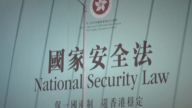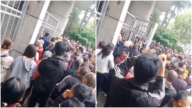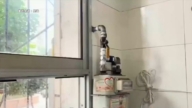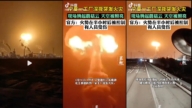【新唐人2014年07月08日訊】今年5月,中國大陸房價出現了兩年來的首跌,這讓房地產行業內越來越多的人擔心﹕中國樓市會不會崩盤。事實上,這種擔心越來越成為了現實。最新的統計資料顯示,今年上半年,一線城市住宅成交量暴跌了三到四成,越來越多的地方政府不得不暗中放鬆限購政策來救市。請看報導。
亞太地區最大的地產代理機構「中原地產」,據它的資料顯示,截至6月26號,北京今年新建住宅合計簽約22782套,較去年同期下滑48.77%,簽約套數和簽約面積都創下近9年來同期的最低值,總成交額也比去年同期下降了了38%。
與此同時,北京期房住宅和現房住宅「庫存」,合計達到了80844套,創下近18個月的新高。
深圳市商品住宅纍計成交面積和套數,同比去年上半年分別下降40.28%、42.09%;而上海新建商品住宅銷售,同比去年上半年也大跌31.2%。另外,廣州今年上半年全市11區一手住宅成交面積,同比去年下跌了30.4%。
美國南卡羅萊納大學艾肯商學院教授謝田:「對於購房者,現在應該觀望。我覺得現在絕對不是購買的時機,因為沒有人願意買一個即將大幅度跌價的一個房地產。」
美國「南卡羅萊納大學艾肯商學院」教授謝田認為,中國現在房地產的一切表現,就是泡沫破滅的前兆。因為中國的房地產泡沫,以前被中共政府和房地產商聯合起來,吹得太大了,泡沫破滅只是時間問題。
其實,現在很多房地產商遇到了困境。
今年4月份,浙江省奉化市房地產開發商「浙江興潤置業」(Zhejiang Xinrun Real Estate Co.),欠下35億元巨額債務,因資不抵債而破產。而浙江杭州市的「中都集團」(Zhongdou Group),也在6月份因欠資20億,不得不倒閉。
實際上,中國的房價下降是越來越快。
《中國指數研究院》日前發佈的「6月份百城房價指數」顯示,6月份房價環比上月下跌0.5%,而「5月百城房價」環比下降0.2%。杭州在6月份一個月內房價下跌達到驚人的2.06%。
中國房地產諮詢機構——「克而瑞」(CRIC)預測,中國樓市會出現更多的降價潮。
美國《華爾街日報》指出,隨著中國房地產市場繼續下行,將會出現五大輸家,分別是房主、房地產開發商、銀行、影子銀行和地方政府。
《華爾街日報》認為,隨著房價下跌,很多房主的貸款比買新房還要貴。而嚴重依賴土地出讓金的地方政府,也會受到很大打擊。
根據今年初中共國家審計署公布的各地政府性債務審計結果,今年不但是地方政府還債的高峰期,而且很多地方政府性償還債務仍然主要依賴於土地出讓金。
例如,上海「新世紀資信評估投資服務有限公司」透露,廣東省收入有超過一半來自土地轉讓金,上海每年土地出讓金大約為1000多億人民幣。
鑒於當前中國房地產的局勢,很多地方政府紛紛挑戰中央的「限購令」。
最近,武漢市房管局將放寬本地居民第三套房、和外地人購買第二套房的有關政策,呼和浩特市則正式發文宣佈取消限購。北京的限價政策也是悄然鬆動。
據不完全統計,今年以來,杭州、天津、南京、北海、蕪湖、瀋陽等地,暗中鬆綁了限購政策,長沙、海口、貴陽等20多個城市則通過放寬落戶條件等方式「曲線救市」。
謝田:「地方政府現在仍然在為了儘快地取得自己的利益、權貴階層的利益,他們還在拚命的趁這個機會,來繼續鼓吹、增大中國房地產的泡沫。」
謝田指出,中國沒有真正的房地產市場,因為中共從來沒有放棄對土地的控制,老百姓不能得到土地的產權和房子的產權。所以,中國的房地產市場只是一個虛假的、套利的、充滿了陷阱的、和騙老百姓錢的場所而已。
採訪/易如 編輯/宋風 後製/李智遠
Real Estate Panic Arrived, First-Tier Cities Slump 40%
This May, housing prices in China dropped for the first time
in two years, which makes more and more people
in real estate worry: Will China’s property market collapse?
In fact, this fear is becoming a reality.
The latest statistics show that for first half of this year,
the trade volume of residential growth in first-tier cities
dropped 30 percent to 40 percent, forcing more and more
local governments to secretly lighten the buying restriction
policy to rescue the market.
The largest property agency in the Asia-Pacific region,
Centaline Property Agency, has released data saying Beijing’s
total new residential contracts reached nearly 23,000 units
by June 26 this year, which is nearly 49 percent less than 2013.
The number of contracts and contracted area
reached their lowest value in the past 9 years;
the total turnover rate fell 38 percent compared to last year.
Meanwhile, Beijing forward delivery housing and existing
housing “Inventory" reached almost 81,000 units,
a new peak in the past 18 months.
Accumulated turnover of Shenzhen commercial residential
areas and the number of units dropped by 40 percent and
42 percent respectively compared to the first half of last year;
Shanghai new commercial housing sales fell 31 percent.
In addition, eleven districts of Guangzhou’s first hand
residential sales area decreased 30 percent over last year’s.
Frank Tian Xie, professor at University of South Carolina,
Aiken School of Business: “Buyers should now wait and see.
I think now is definitely not the time to buy.
No one wants to buy property that will soon lose it’s value."
Xie says all China’s real estate manifestations are
the precursor of a bubble burst.
The combination of the Chinese Communist Party
and real estate business has blown China’s real estate bubble
too big, and it’s just a matter of time before it bursts.
In fact, many real estate enterprises
have encountered difficulties.
This April, real estate enterprise Zhejiang Xinrun Real Estate
went bankrupt when it couldn’t pay a debt of $564 million.
Zhongdou Group also had to close down this June
due to being unable to pay a debt of $300 million.
In fact, China’s housing prices are declining faster and faster.
The China Index Research Institute recently released
its “monthly 100 city price index,"
which says June housing prices fell 0.5 percent since May,
while prices in May fell 0.2 percent since April.
Hangzhou housing prices decreased a full 2 percent
within the month of June.
The China Real Estate Information Corporation (CRIC) noted
that China’s property market will see further price cuts.
Wall Street Journal says that the persistent decline
of China’s real estate market will result in five kinds of losers:
House owners, real estate developers, banks,
shadow banks and local governments.
Wall Street Journal says that, along with falling housing prices,
the loans of many home owners are higher than the
price of a new house.
Local governments, which rely heavily on land premiums,
will suffer a heavy blow.
According to an audit of local government debt announced
by China’s National Audit Office, this year is not only seeing
the peak of local governments’ paying back of loans,
but many local governments also still rely
mainly on land premiums to pay back debts.
For example, Shanghai Brilliance Credit Rating & Investors
Service revealed that over half of Guangdong province’s
revenue comes from land transfer payments.
Shanghai’s annual land transfer payments
are around $16 billion.
Due to the current real estate situation, many local
governments have challenged the central government’s
policy of “purchase restriction".
Wuhan Housing Authority will lighten the purchase policy
on local residents buying a third suite, and foreigners buying
a second suite; Hohhot issued a formal announcement to
cancel the purchase restriction; Beijing’s price restriction
policy is also quietly loosening.
According to incomplete statistics, since this year, Hangzhou,
Tianjin, Nanjing, and other provinces, secretly loosened up
on the purchase restriction policy.
Meanwhile, more than 20 cities have been trying to save
themselves by lightening settlement conditions.
Frank Tian Xie: “Local governments continue to promote
and enlarge China’s real estate bubble,
using this opportunity to achieve their own interests
and the interests of the elite class as soon as possible."
Xie says China has no actual real estate market,
because the Chinese Communist Party
has never given up control over the land.
The ordinary people cannot get land or home ownership.
Thus, China’s real estate market is only a false arbitrage,
full of traps, and is just a place to cheat people’s money.
Interview/YiRu Edit/SongFeng Post-Production/Lizhiyuan


























